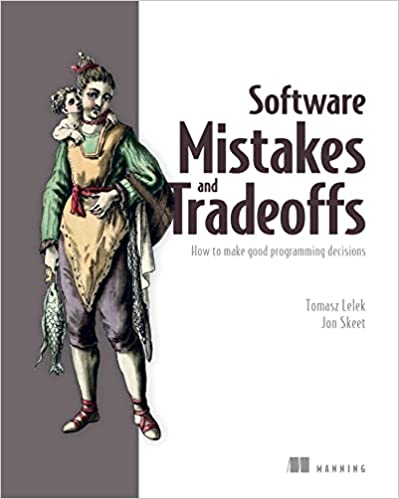
English | 2022 | ISBN: 1617299200 | 418 pages | True PDF | 5.76 MB
Optimize the decisions that define your code by exploring the common mistakes and intentional tradeoffs made by expert developers.
In Software Mistakes and Tradeoffs you will learn how to
Reason about your systems to make intuitive and better design decisions
Understand consequences and how to balance tradeoffs
Pick the right library for your problem
Thoroughly analyze all of your service's dependencies
Understand delivery semantics and how they influence distributed architecture
Design and execute performance tests to detect code hot paths and validate a system's SLA
Detect and optimize hot paths in your code to focus optimization efforts on root causes
Decide on a suitable data model for date/time handling to avoid common (but subtle) mistakes
Reason about compatibility and versioning to prevent unexpected problems for API clients
Understand tight/loose coupling and how it influences coordination of work between teams
Clarify requirements until they are precise, easily implemented, and easily tested
Optimize your APIs for friendly user experience
Code performance versus simplicity. Delivery speed versus duplication. Flexibility versus maintainability-every decision you make in software engineering involves balancing tradeoffs. In Software Mistakes and Tradeoffs you'll learn from costly mistakes that Tomasz Lelek and Jon Skeet have encountered over their impressive careers. You'll explore real-world scenarios where poor understanding of tradeoffs lead to major problems down the road, so you can pre-empt your own mistakes with a more thoughtful approach to decision making.
Learn how code duplication impacts the coupling and evolution speed of your systems, and how simple-sounding requirements can have hidden nuances with respect to date and time information. Discover how to efficiently narrow your optimization scope according to 80/20 Pareto principles, and ensure consistency in your distributed systems. You'll soon have built up the kind of knowledge base that only comes from years of experience.
Purchase of the print book includes a free eBook in PDF, Kindle, and ePub formats from Manning Publications.
About the technology
Every step in a software project involves making tradeoffs. When you're balancing speed, security, cost, delivery time, features, and more, reasonable design choices may prove problematic in production. The expert insights and relatable war stories in this book will help you make good choices as you design and build applications.
About the book
Software Mistakes and Tradeoffs explores real-world scenarios where the wrong tradeoff decisions were made and illuminates what could have been done differently. In it, authors Tomasz Lelek and Jon Skeet share wisdom based on decades of software engineering experience, including some delightfully instructive mistakes. You'll appreciate the specific tips and practical techniques that accompany each example, along with evergreen patterns that will change the way you approach your next projects.
What's inside
How to reason about your software systematically
How to pick tools, libraries, and frameworks
How tight and loose coupling affect team coordination
Requirements that are precise, easy to implement, and easy to test
About the reader
For mid- and senior-level developers and architects who make decisions about software design and implementation.
About the author
Tomasz Lelek works daily with a wide range of production services, architectures, and JVM languages. A Google engineer and author of C# in Depth, Jon Skeet is famous for his many practical contributions to Stack Overflow.
Table of Contents
1 Introduction
2 Code duplication is not always bad: Code duplication vs. flexibility
3 Exceptions vs. other patterns of handling errors in your code
4 Balancing flexibility and complexity
5 Premature optimization vs. optimizing the hot path: Decisions that impact code performance
6 Simplicity vs. cost of maintenance for your API
7 Working effectively with date and time data
8 Leveraging data locality and memory of your machines
9 Third-party libraries: Libraries you use become your code
10 Consistency and atomicity in distributed systems
11 Delivery semantics in distributed systems
12 Managing versioning and compatibility
13 Keeping up to date with trends vs. cost of maintenance of your code
Code:
NitroFlare
https://nitro.download/view/1EA9E7D6581C1F7/cgfqq.S.M.a.T.H.t.m.g.p.d.rar
Rapidgator
https://rapidgator.net/file/1097fcc0921e0bd57113a28deb755ddb/cgfqq.S.M.a.T.H.t.m.g.p.d.rar.html
Uploadgig
https://uploadgig.com/file/download/8F05f6d19c34cc71/cgfqq.S.M.a.T.H.t.m.g.p.d.rar